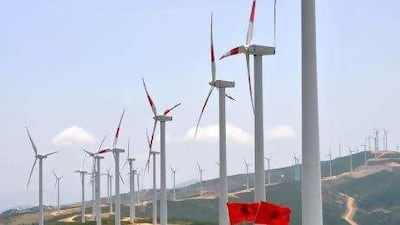Countries in the MENA region with little or no oil and gas deposits are endowed with abundant sunlight and sparsely occupied land - resources that could make the region a renewable energy powerhouse. The World Bank is providing Egypt, Jordan, Morocco, Tunisia and Algeria with a total of US$5.5 billion (Dh20.2bn) in funding for solar projects to be completed by 2015. The projects'combined electricity generation capacity of 9,000 megawatts would equal nearly the total installed power capacity of Abu Dhabi.
Jordan, Morocco and Tunisia import almost all their oil, and Egypt could become a net oil importer as early as this year. "This is a most strategic and significant initiative for MENA countries," said the bank's vice president for the region, Shamshad Akhtar. "It will facilitate faster and greater diffusion of this technology in a region which holds significant potential." Several of the recipients have already taken strides towards large-scale renewable power generation. They have most actively developed wind power, which is cheaper than solar.
Recently, Egypt's government set aside land for a 1,000mw wind park beside the blustery Gulf of Suez. It has space for several projects of 200-300mw each, to be developed by private-sector consortiums or government and private-sector partnerships. Egypt hopes to generate 20 per cent of its electricity from renewable sources by 2020. It already has 365mw of wind capacity installed, the most of any African country. Its two hydroelectric dams on the River Nile date from 1902 and the 1960s.
Morocco has the region's most ambitious clean-energy goal - to generate enough renewable power by 2020 to meet 42 per cent of electricity demand. The country has significant wind, solar and hydroelectric potential to offset its lack of oil and gas. Last month, Morocco inaugurated Africa's largest wind farm, the ?250 million (Dh1.18bn) 140mw Dahr Saadane facility south-east of Tangiers. The government plans ?2.8bn of further investment to boost wind-energy capacity to 2,000mw from 280mw in the next 10 years and ?7bn for a matching solar capacity.
Tunisia plans to install 180mw of wind power by the end of next year and to start exporting renewable energy to Italy in 2018. Jordan is the renewable energy leader among the Levant countries with wind and solar projects under development. In January, it passed a law allowing private backers of renewable energy projects to bypass the competitive government bidding process and negotiate directly with the energy ministry. The new law also requires Jordan's national power company to purchase all electricity from such projects and cover the cost of grid connection. Owners of solar or wind facilities are allowed to sell electricity back to their power provider through net metering.
Jordan aims to produce 7 per cent of its power from renewable energy by 2015 and 10 per cent by 2020. It has established a government fund to support energy conservation and clean-energy initiatives. To spur the development of 600mw of solar power by 2020, the government has reserved part of an industrial estate in its southern desert for a solar park with room for three utility-scale projects. The first is expected to be in service in 2012.
In North Africa, the OPEC members Algeria and Libya are investing the least in renewable power, but even Algeria is in the final stages of commissioning a 150mw integrated gas and solar project. Libya is converting its oil-fired power stations to gas so it can export more crude. Both countries are significant gas exporters and are unlikely to pursue renewable energy seriously until higher international gas prices make exports more lucrative than burning gas for power.
In the GCC, which trails North Africa and the Levant in renewable power, the UAE is the leading clean-energy proponent, with a government target of meeting 7 per cent of power demand from renewable sources by 2020. Lacking wind potential, Abu Dhabi has 10mw of grid-connected photovoltaic capacity to power the construction of Masdar City, its landmark carbon-neutral property development. Masdar, the Abu Dhabi Government's clean energy company, recently awarded a $600m contract for the construction of a 100mw concentrating solar power plant. This technology uses lenses or mirrors that track the sun to focus a large area of sunlight on to a small area, generating heat for power production. Other emirates plan smaller solar projects.
Most Arab Gulf states are short of gas but have ample crude reserves they can burn for power until pollution and the loss of export revenue become pressing issues. Their governments are concerned but do not yet feel urgent need for change. One consequence is that Egypt and Jordan are ahead in introducing fuel subsidies, in part to make renewable energy more competitive. In the GCC, the UAE has made the most significant moves to cut subsidies, supporting its clean energy programme.
tcarlisle@thenational.ae

